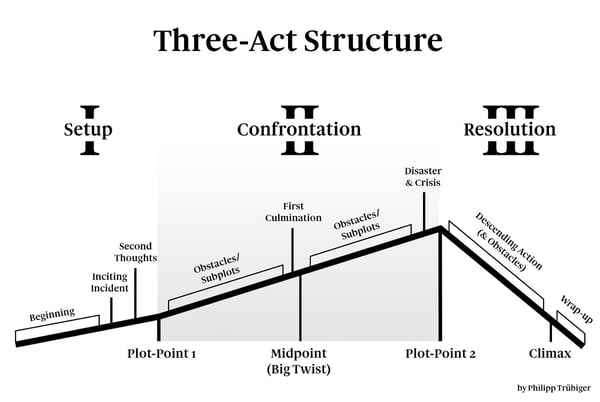
Some podcasts fail before the host ever hits the record button.
Writing a script for your podcast is one of the most vital—and often overlooked—aspects of creating a show. A podcast script is where the content creator decides on the structure, tone, and overall message of each particular episode in their series.
Without it, the podcast risks languishing in a morass of unfocused gibberish that will leave even the most zealous of fans scratching their heads in confusion.
A podcast script is meant to structure the ideas of any given podcast episode and ensure that a clear, concise narrative is conveyed to the audience.
Knowing how to craft a podcast script that strikes the right chord with your audience is key to your success. You can also use podcast hosting platforms to create episode transcripts and improve your podcast's discoverability for listeners searching for specific topics.
This guide will show you the different script structures you can use and explain when each one is best. Finally, at the end of this article, you'll find a free template for your own podcast script.
Podcast scripts can take various forms; in many ways, they’re an expression of the host's most comfortable podcasting style. Some scripts are written, word-for-word templates of what the host plans to cover during the episode. Others are simply loose outlines that leave room for spur-of-the-moment ideas to take center stage and lead the episode into surprising and uncharted territory.
Either way, there’s no “correct” way to write the script for your podcast, so long as you recognize their utility: focusing your content so your compelling podcast idea shines through.
That being said, here are a few tips to get you started:
Instead of a full-blown script, think of your podcast episode as a roadmap. Brainstorm your talking points and craft out the transitions. This loose structure keeps you on track while allowing room for spontaneous detours and witty asides.
Don't write how you think you should sound; write how you actually talk, with a little refinement, of course. Imagine you're explaining this topic to an engaged friend over coffee. Weave in your natural humor, quirks, and storytelling style – that's what makes your voice unique.
Dot your script with mini-hooks. These are attention-grabbing sentences or questions that punctuate your flow and keep listeners engaged. Think of them as sonic billboards reminding listeners why they tuned in.
Inject your script with snippets of cool audio. Integrate interview soundbites, listener voicemail questions, or even quirky sound effects to create a dynamic soundscape that keeps ears perked up.
Transitions are your script's silent heroes. Craft smooth segues that bridge topics without jarring the flow. Use humor, a thought-provoking question, or even a callback to a previous point to keep listeners engaged in the journey.
Always leave room for improvisation. The magic of conversation often happens in unplanned moments. Allow space for tangents, witty banter with co-hosts, or even a hilarious blooper that becomes podcast gold.
Tip: Check out how to reel in listeners through the perfect podcast cover art.
When I was younger, I was fascinated by the prose writing process and devoured every word I could find from my favorite authors on the subject. The general consensus is that there is a spectrum of writing styles, most notably tied to the prep work done by the author.
Game of Thrones author and Herald of our Current Cultural Zeitgeist George R. R. Martin described the two extremes as “Architects” and “Gardeners.” The former were more focused on planning the minutiae of the upcoming project, while the latter were more concerned with an initial idea they let grow organically.
"There are two types of writers: architects and gardeners. The architects plan everything ahead of time. The gardeners dig a hole, drop in a seed, and water it."
George R. R. Martin
The applications of this heuristic to scripting your podcast are clear. However, the auditory nature of podcasting infuses a certain performative quality that is largely absent in prose fiction writing. To address these elements, I’ve added the category of “Professor” to Martin’s original spectrum.
This creator persona represents the furthest end of the spectrum and is geared towards content creators who want to outline almost every word they plan on saying during the course of an episode. The Professor carefully considers every word and every verbal pause they plan to take during their episode and writes it down to be read. They have a very specific goal they want to accomplish and don’t want to waste anyone’s time while doing it. A good example of this style of narrative podcast is This American Life.
The obvious benefit of this type of prep work is that it makes it easy to convey a point quickly and concisely. You’ll always know what to say because it will be right there in front of you. The drawback is that you have to be careful not to sound stilted and unnatural while reading your script.
The Professor has to take great care to make their episodes sound natural, usually with delivery notes as reminders. This style is recommended for new podcast hosts as it forces you to think through every aspect of your show before you start recording.
The Architect, best exemplified by Dan Carlin’s Hardcore History, exists at the midpoint of this creative spectrum. It has the same broad structural elements as the Professor but forsakes the word-for-word planning for a bullet list of topics, conversation beats, and main points.
While the content is still extremely structured—the Architect knows how many rooms and what sort of roof their creation is going to have—the rigid surety of the Professor is exchanged for a script that is still brimming with detailed information that needs to be covered for the episode while leaving room for innovation in the actual execution of the episode.
Architects have a strong sense of what they want to make. This form of structure is excellent for interviews as it sets out very clear guideposts for the host to follow but leaves enough room for the guest to take the lead and offer surprising new insights into a topic.
Finally, at the far end of the creative spectrum, we have the Gardeners; instead of the rough sketches developed by the Architect, this creative persona opts for a high-level overview of each topic that needs to be covered during the upcoming episode.
While the Gardener knows what sort of seed they’ve planted with their outline for that episode — they know if they’ve planted an uplifting, hopeful seed or a dark and melancholy seed, to give a few examples — the ultimate shape of the finished product will remain just as unknown to them as it will to their listeners until they have finished recording the episode.
This style of outlining is best if you have a lot of knowledge about the show's subject or if you’re co-hosting. It's much easier to be spontaneous when someone else engages with your ideas.
Tip: Unsure about which podcast software is best for your needs? Hear exclusive tips from an expert and make the right choice.
Based on the different structures discussed above, here are a few sample podcast script templates for your reference.
Note: Spaces closed in brackets [ ] indicate that the speaker should pause, while italicized text represents places for emphasis. Additionally, due to the involved nature of this style of podcast script, we’ve only written out the podcast intro and one topic to give you a sense of what the rest should look like. For a better sense of what sections you need for a full podcast script, please see templates 2 and 3.
|
Introduction Cue intro music Hello, and welcome to the XXX podcast [ ] my name is XXX. [ ] Today, we’re going to be going over how to write a professor-style script for your podcast episode. It’s also important that you read your script aloud before you record your podcast. Do not go in the cold [ ]. You need to make sure you’ve tweaked it for the ear. Otherwise, it will sound stilted and unnatural. You don’t want to sound like you’re reading even if you are. If you need help making your script flow, you can print it out and put reminder marks for emphasis, a slower or faster pace, or pauses. You can also use tools like brackets and italicization to work them into your document naturally. Oh, and by the way, you should also write in the cues for music and sound effects. Make sure they STAND OUT so you don’t accidentally read them or something. That’d be a bit of a bummer. Despite this, the benefits of this style of script are clear, and I really recommend it if you’re just starting your podcasting journey or perhaps don’t feel comfortable improvising the content of your show. |
While the Architect forgoes writing out the professor's word-for-word outline, they still include an immense amount of detail in their script.
| Section | Topic | Supporting Points | Other Notes |
| Intro | Introduce the podcast, episode name, and number | Lead with XXX music | Establish the problem the listener might be encountering with making their own podcast |
| Main Topic One | The basics of writing a podcast script |
The different kinds of podcast scripts Discuss the pros and cons of each |
Professor v Architect v Gardener What are the benefits of each? |
| Segue | Play XXX song | ||
| Main Topic Two | Three act structure | Rising action, midpoint, and falling action. |
Highlight the importance of pacing Elements of storytelling |
| Main Topic Three | Examples of podcasts with good structure | This American Life, Hardcore History, etc. | Touch on how they use structure to build tension and raise the stakes of their narrative |
| Sponsored Message | Play pre-recorded message |
|
|
| Main Topic Four | Rundown of how to put your ideas into a script |
Ideation and the creative process Different things to consider |
Emphasize the importance of considering your audience when conveying your core idea |
| Outro | Conclude with a brief overview of what was covered, etc. | Finish with XXX outro music | Call to action (ask for subscription or review) |
This form of podcast script is by far the most basic of the three, using only a simple bullet list to convey the topic roadmap for the episode.
| XXX Podcast, Season X, Episode Y Date: XX/XX/XXXX |
|
Introduction Cue music: Set an upbeat tone for the episode Main Topic One: The basics of writing a podcast script Main Topic Two: Three-act structure
Sponsored Message: Play pre-recorded message Main Topic Three: Examples of podcasts with good structure
Main Topic Four: Turning your ideas into a script
Outro
End with normal outro music |
Now that we’ve explored the different types of scripts you can use to begin structuring your episodes, we need to discuss what these scripts are meant to accomplish: creating a narrative.
Stories are how humans make sense of the world around us. They give us context for the strange and unexpected things that happen almost every day and imbue them with a deeper meaning. A cohesive narrative is the most important part of a podcast. Without it, your audience won't be able to form an emotional connection with the information you want to convey.

Source: Philipp Fritz Trübiger
Below I outline the basic structure of a podcast in order to give you a broad sense of what ingredients are necessary to brew a good story for your podcast episode:
A podcast episode, like any narrative medium, can be broken down into three “acts” that serve to capture your listeners: the inciting incident, the midpoint, and the resolution.
This structure is one of the most basic in storytelling. If you look closely, you’ll find it as far back as the Mesopotamian poem The Epic of Gilgamesh all the way to each of the new entries in the Marvel Cinematic Universe.
While it’s not the only type of story structure, it does serve as an excellent foundation for crafting your own narratives. Let’s take a closer look at each act in the three-act structure and how you can apply it to your podcast script.
The first act is where a host can use expositional detail to establish the setting that will serve to frame the rest of the coming content. It should introduce the characters of the episode (even if that character is you), their relationships, and the problem that keeps them from achieving their goals.
Additionally, this is the space in the show where you want to set the stakes. Why is what you’re talking about important? What’s the problem, and what things have been tried to fix it? This can be anything as dramatic and obvious as a murder in a narrative podcast or as simple as a challenging HR scenario for a business show.
You want to hook your listeners with a dramatic, catching opening to your episode. Don’t lead on the solution to their problems. Promise them a discussion and exploration of the issue, but save your reveals for when they’ll be the most impactful.
The midpoint is where a podcast shifts from reacting to the problem to taking active steps toward fixing it. This usually involves raising the stakes by highlighting an attempt to solve the issue, most often met with failure.
This is where you start doling out the tools and information your audience will need to solve the problem that brought them to you in the first place. However, the ultimate solution is still out of reach. Highlight the lessons that were learned from the failure and show how they helped the character get to where they needed to go.
Here it is. The final destination of your podcast episode.
The resolution is where you want to let the curtain fall to the floor with a dramatic flash of fabric and finally give your audience the full picture of what is needed to solve the problem.
This is what your episode is building towards and should be the primary thing you decide in your script. Whether you’re a Professor or a Gardener, you need to know the end point of your episode and roughly how you’re going to get there.
No matter, if you’re a Professor, an Architect, or a Gardener, a good script is an essential roadmap to help ensure the success of each and every episode of your podcast. Identify what style of scripting works best for you and start making the stories that people will want to hear.
Are you wondering what else you need? Check out the best free podcast editing software to ensure your audio stands out.
This article was originally written in 2019. It has been updated with new information.
Piper is a former content associate at G2. Originally from Cincinnati, Ohio, they graduated from Kenyon College with a degree in Sociology. Their interests include podcasts, rock climbing, and understanding how people form systems of knowledge in the digital age. (they/them/theirs)
Podcasts have become an essential element of the digital landscape — and you should be a part...
 by Piper Thomson
by Piper Thomson
You move your microphone into position, take a deep breath and freeze. What do you say?
 by Piper Thomson
by Piper Thomson
“You get a podcast. And YOU get a podcast!”
 by G2 Staff
by G2 Staff
Podcasts have become an essential element of the digital landscape — and you should be a part...
 by Piper Thomson
by Piper Thomson
You move your microphone into position, take a deep breath and freeze. What do you say?
 by Piper Thomson
by Piper Thomson


